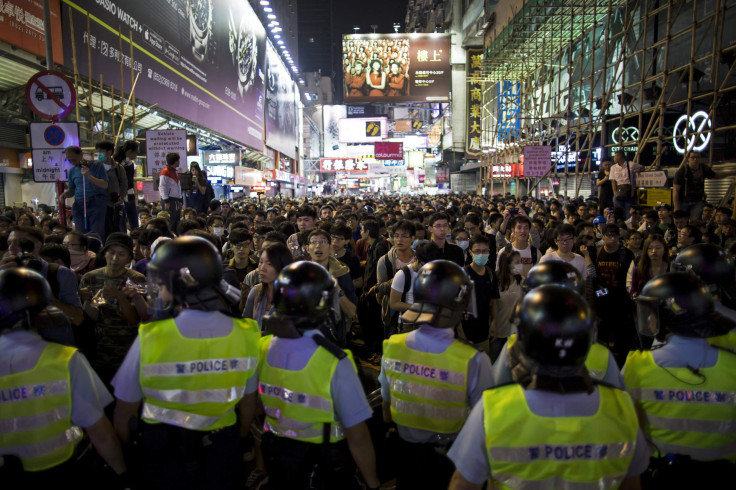Hong Kong Protesters Threaten To Target Government Buildings After Clashes At Mong Kok

Student protesters in Hong Kong have threatened to target government buildings for occupation after police clashed with demonstrators while clearing one of the three main pro-democracy protest sites that have paralyzed parts of the city for months.
Yvonne Leung, a leading member of the Hong Kong Federation of Students, told local broadcaster RTHK, "I think we have made it very clear that if [the police] continue the violent way of clearing up the place, we will have further actions... The further actions include a possibility of some escalations pointed at government-related buildings or some of the government-related departments."
Hong Kong police began removing protesters from a targeted area of the protest site at Mong Kok on Tuesday, following a court injunction against the protesters. However, on Wednesday, police began to clear areas of the protest site that were not covered by the injunction, displacing protesters from the entirety of the area that they had occupied for two months.
Violent clashes followed the removal. Several protesters were hospitalized with head injuries sustained when police struck protesters with batons, and officers used a potent pepper spray-like solution to disperse protesters who attempted to reoccupy the site after being dispersed, according to the South China Morning Post.
The Mong Kok protest site is regarded as the most militant of Hong Kong's three Occupy Central protest sites. It has seen repeated clashes between protesters and police, as well as between protesters and anti-Occupy groups, who reportedly include shopkeepers in the bustling commercial district, as well as taxi and private bus operators, and triad gangsters.
Joshua Wong, leader of the Scholarism student group, which has been at the forefront of the protests since they began in late September, was arrested at the Mong Kok protest site late Wednesday local time, and was subsequently banned from a large area of Mong Kok as a condition of his bail, according to Reuters.
Police have made at least 169 arrests in the Mong Kok district since Tuesday, for a variety of offenses including assaulting a police officer, criminal damage and possession of offensive weapons, according to the SCMP.
Protesters interviewed by International Business Times in the days leading up to the clearance action at Mong Kok said that they would not resist attempts to remove them, but planned to reoccupy nearby areas as soon as possible.
A small protest site in the Causeway Bay shopping district, and the largest protest site outside government headquarters in Admiralty, remain intact for the time being.
The three founding members of the Occupy Central group, Reverend Chu Yiu-ming, Benny Tai and Chan Kin-man, plan to surrender to Hong Kong police for arrest on Dec. 5. But, the leaders of student groups, who have come to play a more prominent role in the pro-democracy movement than the Occupy group's founders, plan to press on with their civil disobedience, according to the SCMP.
© Copyright IBTimes 2024. All rights reserved.












